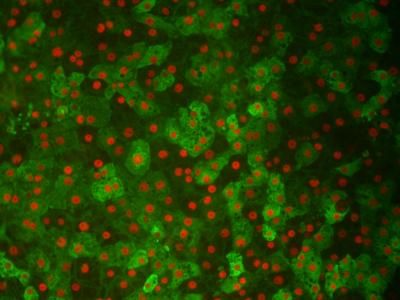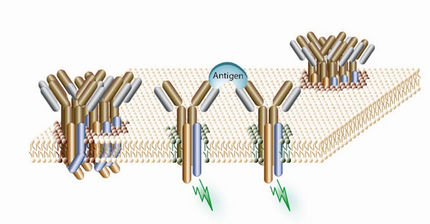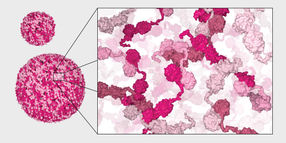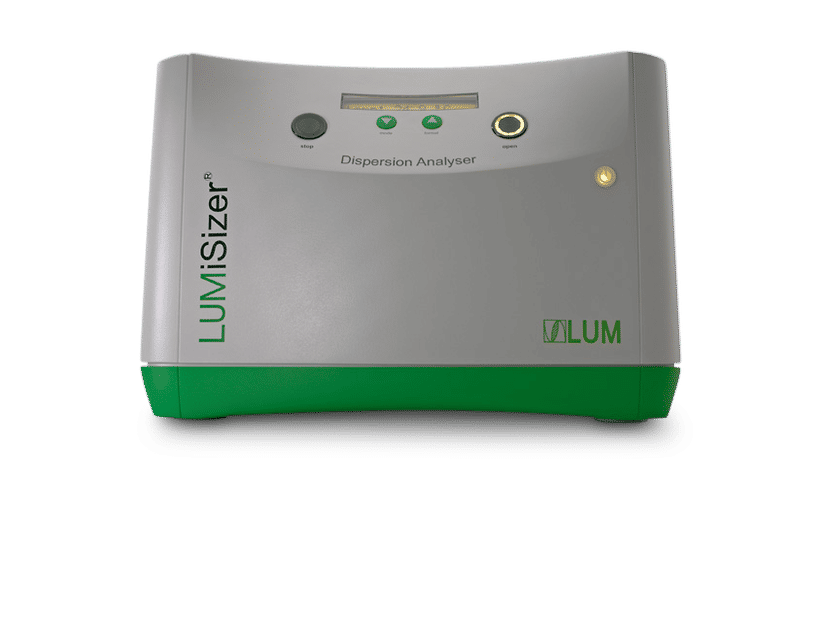First live targeting of tumors with RNA-based technology
Advertisement
Finding and treating a tumor without disturbing normal tissue presents challenges – sometimes the most effective therapies can be invasive and harsh. Researchers at Duke University Medical Center have devised a way they might deliver the right therapy directly to tumors using special molecules, called aptamers, which specifically bind to living tumor tissue. They screened a large pool of aptamers in a rodent with liver cancer until they found the best molecule to bind to a tumor protein. The study was published in Nature Chemical biology.
"We are already exploring attaching chemicals to the aptamers, so the aptamer molecules could deliver tumor-killing agents where they are needed, which is the next phase of our research," said senior author Bryan Clary, M.D., chief of the Division of Hepatopancreatobiliary and Oncologic Surgery.
Aptamers are small pieces of RNA that bind to a specific target molecule, usually a protein. They offer ease of use because they can be easily regenerated and modified and therefore have increased stability over some other agents, such as protein-based antibodies. Notably, they have a very low chance of immune-system interference, making them great candidates for tumor diagnosis and therapy.
"Most importantly, it's not necessary to have detailed knowledge of protein changes in the disease before the selection process," said lead author Jing Mi, M.D., Ph.D., assistant professor in the Duke Department of Surgery. "This greatly simplifies the process of molecular probe development. The selected aptamers can be used to discover proteins not previously linked with the disease in question, which could speed up the search for effective therapies."
The researchers used a large pool of RNA strands and applied them to a rodent with a liver tumor, the type of metastatic tumor that often results from a colon cancer tumor.
"We hypothesized that the RNA molecules that bind to normal cellular elements would be filtered out, and this happened," said Clary, who treats colon cancer patients. "In this way, we found the RNA molecules that went specifically to the tumor."
The researchers removed the tumor, extracted the specific RNA in the tumor, amplified these pieces of RNA to create a greater amount, and reinjected the molecules to learn which bound most tightly to the tumor. They repeated this process 14 times to find a good candidate. The team found a tumor-targeting RNA aptamer that specifically bound to RNA helicase p68, a nuclear protein produced in colorectal tumors.
"This aptamer not only binds to p68 protein in cell culture, but also preferentially binds to cancer deposits in a living animal," Mi said. "The nice thing about this aptamer approach is that it could be used to discover the molecular signatures of many other diseases."
Clary said the process could be repeated with different types of tumors. For example, a scientist might take a breast cancer line and grow it in the lung as a metastasis model and then perform in vivo selection to identify RNAs specifically binding to the lung tumor.
"This would work, theoretically," Clary said. "The idea of selecting molecules targeting a tumor growing in a body that results in a useful reagent for biologic exploration and therapy delivery in tumors is exciting."
Other news from the department science
Most read news
More news from our other portals
See the theme worlds for related content
Topic world Antibodies
Antibodies are specialized molecules of our immune system that can specifically recognize and neutralize pathogens or foreign substances. Antibody research in biotech and pharma has recognized this natural defense potential and is working intensively to make it therapeutically useful. From monoclonal antibodies used against cancer or autoimmune diseases to antibody-drug conjugates that specifically transport drugs to disease cells - the possibilities are enormous

Topic world Antibodies
Antibodies are specialized molecules of our immune system that can specifically recognize and neutralize pathogens or foreign substances. Antibody research in biotech and pharma has recognized this natural defense potential and is working intensively to make it therapeutically useful. From monoclonal antibodies used against cancer or autoimmune diseases to antibody-drug conjugates that specifically transport drugs to disease cells - the possibilities are enormous



























































